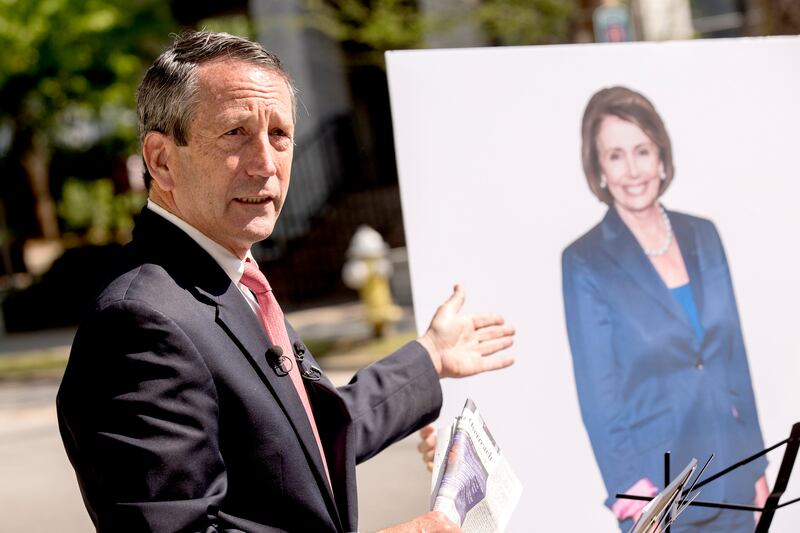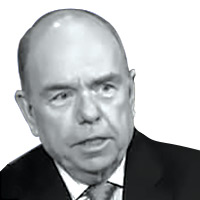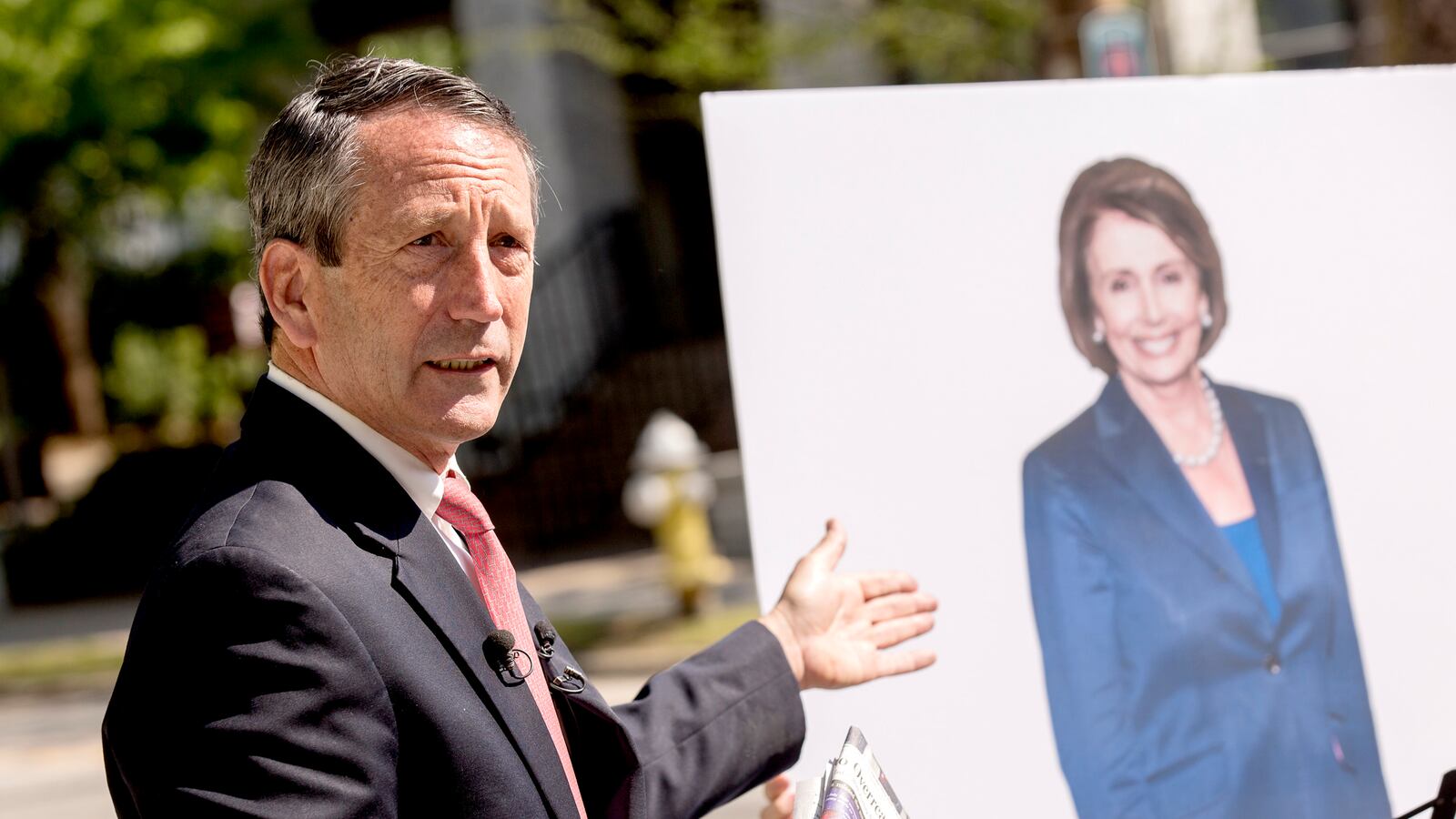Former South Carolina governor Mark Sanford, maybe the dumbest political adulterer in memory, never took that hike on the Appalachian Trail, but it turns out he did sneak into his ex-wife’s house in defiance of a court order. Presumably he thought he wouldn’t get caught—again—as he campaigned in a special election for Congress against Democrat Elizabeth Colbert Busch. He was caught—and was almost instantly abandoned by his own party’s national congressional campaign committee and the right-wing Club For Growth. Even Busch’s brother, the master of political satire Stephen Colbert, couldn’t have made this up.

With Sanford trying to dig his way out of a nine-point hole in the latest poll in the deeply red district he represented until 2002, he suddenly decided to debate a cardboard cutout of Nancy Pelosi. It was the pathetic stunt of the desperate candidate who soon will have plenty of free time to spend down in Argentina. It was also a rote Republican reflex that reflects the latest Gallup ratings showing Pelosi as the “least liked Hill leader”—with a 48 percent unfavorable and a 31 percent favorable.
Pelosi is undaunted by these numbers as she relentlessly pursues the unprecedented prospect of recapturing the house in a midterm election during the sixth year of the president of her own party. In a Fox News survey, and that network knows its Republicans, they dislike her as thoroughly as they detest Obama. And she can wear that as a badge of honor: Pelosi, arguably the most effective House speaker of our time or all time, played a critical, often decisive role in passing the most sweeping range of progressive change since the New Deal and the Great Society.
Even before she was elected Democratic leader in 2003, she was a pioneering architect of legislation to combat HIV/AIDS. She voted against the Defense of Marriage Act—and against the resolution authorizing George W. Bush to go to war in Iraq. And after she became leader, she marshaled near unanimous Democratic opposition to Bush’s scheme to privatize Social Security, and the intimidated the GOP majority didn’t even dare bring it to a vote.
As speaker in 2007, she pushed through an increase in the minimum wage—and a once resistant Bush signed it as part of the bill for Hurricane Katrina relief and supplemental funding for U.S. military forces in Iraq. A year later, she pungently described Bush as “a total failure, losing all credibility…on the economy, on the war, on energy, you name the subject”—an assessment that’s worth remembering during this week’s exquisitely polite rituals at the dedication of the Bush presidential library.
A masterful inside politician, a Democrat’s Democrat, she nonetheless transcended partisanship when the economic crisis hit during the twilight of the Bush administration. After Republicans first defeated the bank bailout bill in the House—and the Dow Jones Industrial Average plunged 777 points in one day—she persuaded 33 Democrats to switch their votes, and the bill passed despite the opposition of a majority of GOP members. The bailout wasn’t popular, but it was an essential first step back from the brink of a second Great Depression, and then, as now, Pelosi knew that popularity counts in politics, but it isn’t the only standard of public service.
Her chance to change America as well as his came with Barack Obama’s inauguration. The following two years saw what the political scientist Norman Ornstein called “the best Congress you’ll ever hate.” The unrelenting GOP opposition, the distortions and the demagoguery, would cost House Democrats their majority in 2010, but in the meantime they did what had to be done and wrote a new chapter in our national life.
The president, Pelosi, and her leadership team secured a second economy-saving measure, the $800 billion stimulus package, without a single Republican vote in the House. The legislation not only included one of the biggest middle-class tax cuts in history but also pumped resources into broadband and wireless Internet, clean energy, a modern electricity grid, education, transportation, and infrastructure. It responded to “the fierce urgency” of the moment—and it advanced a futuristic vision of America. The investment could have been greater, but it was the most that could be squeezed through a polarized Congress. Or as Michael Grunwald of Time put it in his book The New New Deal, the stimulus was “stocked” with “game-changers” that will strengthen the economy for decades to come.
Pelosi also had to maneuver the Dodd-Frank Wall Street reform through the House on a party line vote. And it was parliamentary sleight-of-hand that ushered in student loan reform, with the GOP defending the big banks and higher interest rates against direct lending at lower cost to college students. One act of legislative legerdemain was succeeded by another.
Some measures were easier. The Lilly Ledbetter Fair Pay Act to protect women in the workplace passed early and fast, with near unanimous Democratic backing; three Republican House members even supported it. But most of the time, the landmark legislation was a near-run thing.
Nowhere was that truer, of course, then on the century-long effort to achieve comprehensive health-care reform that covers uninsured Americans. And nowhere was Pelosi’s role more pivotal. After Ted Kennedy’s death and Scott Brown’s victory in the special election to succeed him, a somber meeting convened in the White House. Many, indeed most, of Obama’s advisers were urging him to settle for a scaled-down bill that expanded coverage for children. The president let then chief of staff Rahm Emanuel make the case to Pelosi and Senate Majority Leader Harry Reid. “What makes you think I would support that?” Pelosi tartly replied. She knew this was the moment, the only moment, when this momentous change was possible—or it might have to wait decades more.
The president stood his ground—and the speaker then had to cajole her caucus into accepting the Senate’s version of reform because there were no longer 60 votes in that chamber to break a GOP filibuster.
Economic dissatisfaction with a Bush downturn whose effects persisted into the midterms and beyond, exacerbated by partisan obstruction of additional economic recovery legislation, combined with the vast scope of Democratic accomplishment and paranoid Republican fantasies like “death panels,” shattered Pelosi’s House majority and her speakership in the 2010 election. Even then, she focused on some vital unfinished business. In the lame-duck session of Congress, the president, Pelosi, and Reid deftly engineered the repeal of Don’t Ask, Don’t Tell—especially important to the soon-to-be deposed speaker, a tireless advocate of gay rights who had pledged that the policy would be gone by the end of the year.
The tide of transformative progress ended there. The new GOP House and filibustering Republicans in the Senate calculated that the gridlock and a sluggish economy were their road back to the presidency. Pelosi herself was determined to regain the House. She and Rep. Steve Israel, chairman of the Democratic Congressional Campaign Committee, recruited an impressive roster of candidates and raised a record amount of money. It was a high mountain to climb; they needed to pick up 25 seats. They just might have done it—the momentum was with them in early October—if Obama had shown up for the first presidential debate and Romney had continued his post-convention slide. As it was, Democrats won the popular vote for the House, by 1.6 million, but because of gerrymandered districts, gained only eight seats.
So now the magic Democratic number is 17—and Pelosi is at it again, with conspicuously boundless energy and determination. I heard her—and Israel—outline their strategy at a session in Los Angeles. It’s not merely possible but plausible. Yes, they will have to confound the gerrymandering and all the conventional wisdom about midterms—and all the smart money says they can’t. And yes, they will need Obama’s operation, now renamed Organizing for America, and other super PACs to pitch in and turn out voters who usually stay home in non-presidential contests.
It would be sweet justice to see the best House speaker we’ve known become speaker again. It also would enrage those who have made Pelosi an object of derision and hate. I’m convinced that much of the enmity toward her is rooted in sexism—just as much of the bitter hostility toward Obama is rooted in racism. Too many can’t abide the inexorable movement toward a newer, more equal America.
In any event, Nancy Pelosi has already left a powerful imprint on the character of the nation. She is one of the “few” of whom it can already be said that she did “bend history itself.” And just maybe Mark Sanford was debating the cutout of a woman who once more will be speaker of a House he will never serve serve in again.






